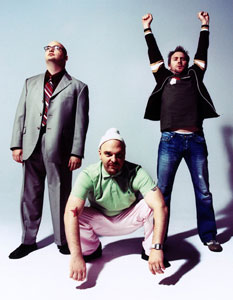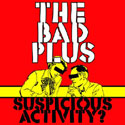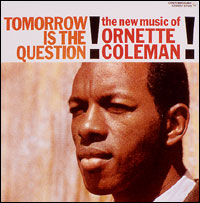The Bad Plus Rocks

Last Friday, we saw The Bad Plus and Color and Talea at the Somerville Theatre. It was one of the best live shows I’ve seen in a long time. The two groups, while superficially similar in that they are both avant garde jazz/funk influenced bands with similar instrumentation, were fundamentally different in influences and vibe. They were both quite innovative, though, and pushed boundaries in ways that felt really fresh.
The Bad Plus was particularly remarkable live. I’ve been listening to their album, These Are The Vistas, for a long while, but I wasn’t prepared for the dynamicism and almost-falling-off-the-edge feeling of their performance. Rather than the typical “jazz trio” with two musicians performing backup rhythm section while the other one does an improvisational solo, the image that came to mind for me were three jugglers conversing on a party line. They created more combinations of three standard instruments than I thought possible. You don’t really pick up on it in on the album, at least not until after you’ve seen them live.
I’m not sure who best to compare them with; there’s definitely some Keith Jarrett in there, but otherwise, I’m at a loss. Maybe Stravinsky, and Bach or Chopin. Their pieces feel more like “compositions” than most jazz, but somehow that doesn’t undercut the spontaneous feeling of it.

Their new album (the fourth), Suspicious Activities, is even better than the first. They are masters of giving you just enough of a funky groove to get into it, and then sliding into something more free form, and then just when you feel like you’re about to lose your grounding entirely, they’ll slide back into the funk. Here’s a less-than-30-second clip from “Theme from Chariots of Fire” which is a good illustration: ogg format (388k) and mp3 format (697k). (For some reason, they called this “The Theme to Cagney and Lacey” in concert.)
Most of the songs on Suspicious Activities have some accompanying narrative story, which is unusual for an instrumental jazz album. For example, ‘Rhinoceros is My Profession’ is about a bullfight. After the matador slays the bull and is basking in adulation, the gate opens and a rhinoceros comes charging into the ring. Ethan Iverson, the pianist, introduced this story by saying (in a perfectly dry tone of voice), “If there’s one thing we in the Bad Plus all agree on, it’s our mutual disapproval of bullfighting.” Another song, ‘O. G. (Original Gentleman)’ was originally intended to be a tribute to legendary drummer Elvin Jones, but since that was too ambitious a task, it ended up being about the lingering feeling in a donut shop after Elvin Jones has left the place.
They also posted some odd photos of their visit to Somerville on their blog.
 New in circulation on my
New in circulation on my 
